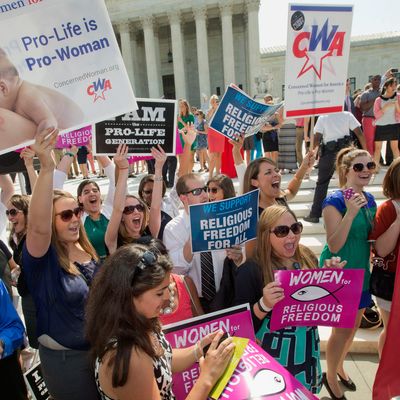
The Supreme Court ruled 5–4 today that the government cannot force closely held for-profit corporations (so, ones at least 50 percent owned by five or fewer people) to cover employees’ birth control, siding with the Oklahoma-based, Evangelical Christian–owned chain craft supply store Hobby Lobby. Hobby Lobby and co-plaintiff Mennonite Conestoga Wood Specialties object to covering certain contraception, as the Affordable Care Act requires, because they believe them to cause abortions — a belief at odds with how the medical community says they work. (The morning-after pill works by delaying ovulation, just like regular birth control, though explaining these scientific distinctions in the face of religious beliefs now feels like wasted breath.)
The Impact: The immediate impact of the decision is that the estimated 14,000 employees of the two companies will have to pay out of pocket for an IUD or emergency contraceptives. It also paves the way for the 50-odd other companies who have sued for similar exemptions, including some that oppose all contraceptives. Equally important, the court’s narrow decision guarantees that birth control — something 99 percent of women rely on in their lifetime — will remain a political tool in debates about corporate power, religious freedom, and the reach of the federal government.
The Argument: The Advocates for Hobby Lobby challenged the birth control mandate under the Religious Freedom Restoration Act (RFRA), a 1993 law that says the government must not “substantially burden a person’s exercise of religion.” The law was best known for cases involving disenfranchised individuals, like Native Americans whose sacred lands are about to get a highway running through them and Muslim prisoners who want to grow beards, not employers. It also has two exceptions: If there’s a “compelling government interest” in the burden, or if the law is not the “least restrictive way of furthering that interest.”
During oral arguments for Burwell v. Hobby Lobby in March, important questions were raised. With the option to forgo the birth control mandate and pay a fine instead, does covering birth control constitute a “significant religious burden” on employers? At what point does an employer’s freedom to have religious beliefs impinge on their employee’s freedom not to? Would the exemption apply to other medical treatment opposed by some religions, like blood transfusions or vaccines?
The Majority: Alito, Scalia, Kennedy, Thomas, Roberts (Catholics, Men)
The court’s narrow ruling — that, either way, the birth control mandate is still not the least restrictive way of guaranteeing birth control access — sidestepped all of them, taking for granted that corporations can expect religious freedom (after all, their First Amendment rights were established in Citizens United), but also that the government has a compelling interest in women’s access to reproductive planning. “There are other ways in which Congress and HHS could equally ensure that every woman has cost-free to contraceptives at issue and, indeed, to all FDA-approved contraceptives,” Justice Samuel Alito wrote for the majority. Kennedy’s concurring opinion said that the government could cover the cost of women’s contraceptive itself.
The Punt: There’s some irony here. When the ACA rolled out, right-wing commenters claimed that Democratic women wanted daddy Obama to cover their “slut pills” and reproductive rights advocates went to great pains to explain that, no, they merely wanted the insurance industry regulated to have a more up-to-date, gender equitable definition of “preventative care.” (For 62 percent of American women, it currently includes contraception.) The ruling amounts to a punt: putting the responsibility for birth control back in the hands of the government while maintaining serious yardage with regards to religious expression, not to mention the status of women’s individual sexual and reproductive lives. It’s still a political battleground, distinct from the many other places religious beliefs could intersect with health care.
The Dissent: Ginsburg, Sotomayor, Kagan, Breyer (Women, Jews)
Justice Ginsburg takes on all the underlying issues at stake in this exception to the RFRA. “The exercise of religion is characteristic of natural persons, not artificial legal entities,” she wrote. Meanwhile, the Affordable Care Act “trains on women’s well being, not on the exercise of religion, and any effect it has on such exercise is incidental.” There’s also this: “Accommodations to religious beliefs or observances, the court has clarified, must not significantly impinge on the interests of third parties.” Her dissent includes a subtle reminder to question the protection of religious expression when the “third parties” all happen to be members of the same group, which has been historically discriminated against. In 1966, she points out, the owner of a restaurant chain “refused to serve black patrons based on his religious beliefs opposing integration.” Then, the court upheld the Civil Rights Act, unanimously; today it was split along gender lines.
Implications: Before today’s decision, liberals worried that the next logical application of a corporate religious expression would be to discriminate against LGBT employees. Although some anti-gay religious activists in Arizona are celebrating today’s decision, Slate points out that Alito and Kennedy were explicit that the ruling could not be used to discriminate against employees on the basis of race or sexual orientation because the government “has a compelling interest in providing an equal opportunity to participate in the workforce.” Never mind that, as Ginsburg wrote, (quoting Planned Parenthood v. Casey), “the ability of women to participate equally in the economic and social life of the Nation has been facilitated by their ability to control their reproductive lives.”





























